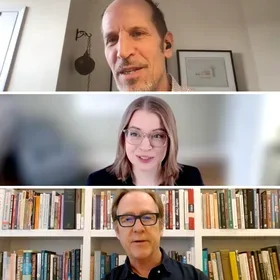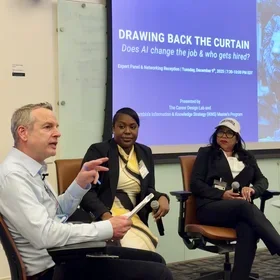By Greg Costanzo | Director of Employer Relations, Career Design Lab, Columbia SPS
Nearly six months since the global pandemic put the country on pause, economic activity in the United States has begun to return. Although the unemployment rate is above 11%, with nearly 18 million people out of work, jobs are out there. The question is: How do you get one—particularly with continued uncertainty about the ongoing pandemic? I put that question to someone who recently had to answer it herself.
Madeline Pope was just shy of her one-year anniversary at the staffing and recruiting firm Atrium when she was let go because of the pandemic’s impact on the business. Two months later, she has just started a new job as a client partner at another staffing and recruiting firm, JBCHoldings.
I had worked with Madeline and her team at Atrium over the last year, developing a partnership strategy to connect Columbia SPS students to employment opportunities with her firm’s clients. When I heard of the major career changes she went through this summer, I immediately reached out. We spoke after she wrapped up her first week on board to find out how she was able to keep positive during her search and what she learned about looking for a job from working as a recruiter.
Greg: Congratulations on your new role, Madeline! You’ve been through a lot lately. I would be grateful to learn about how you found gainful employment during a time when so many are struggling. Could you begin by telling me a little about your career?
Madeline: My career started back when I was a legal assistant while in college. As I approached graduation, I wanted to gain some industry experience before going into law school. I wasn’t sure what that was, but my personal characteristics seemed to point me towards a possibly successful career in sales.
I entered the startup world after college, working for a SaaS research company in New York City as a sales development representative. I found that there were so many moving parts at a startup and learned so much on the job, including how to be gritty. There was constant change all around me. It was a great foundation for building a sales strategy.
From there I moved into the recruiting and staffing space as a business development manager, where my core focus was building out new relationships with companies hiring. I had shifted from an initial sales role to a closing role, and my focus was predominately filling HR and administrative roles.
Sadly, due to COVID-19, the industry was impacted heavily, and I was laid off. But now I’m very excited to be at JBCHoldings, another recruiting and staffing firm, as a client partner. My area of expertise is roles in creative tech (engineers, designers, legal), and I just finished my first week!
Staying connected to the news is important in the job search because you become aware of what industries are thriving and which ones are struggling.
Madeline Pope, Client Partner, JBCHoldings
Greg: The impact the coronavirus had on your industry sadly impacted so many others. But fortunately, you rebounded and within a couple months landed a full-time role. How’d you do it? What secrets do you have?
Madeline: What was very important early on in the process was coming to terms with accepting the lay-off. I took time to reflect, thinking about what I loved about my previous job and where might I find a similar position.
Staying connected to the news is important in the job search because you become aware of what industries are thriving and which ones are struggling. This helps create a broad plan of action of where to start looking.
The short answer to how I got my job is LinkedIn. It’s such a valuable tool that shouldn’t be overlooked. Recruiters are on there searching for candidates. I urge job seekers to update their profiles and set up notifications that alert them when new jobs are posted—being one of the first applications recruiters see is an advantage.
Greg: What else did you learn about job searching from working in a recruitment firm? I understand that LinkedIn is great, but are there other tips you picked up?
Madeline: The simplest thing is to use a recruiter. I understand that some people are turned off by recruiters’ solicitations and simply ignore their requests. Recruiters can get a bad rep—that they don’t care about what the job seeker wants and that they just want to place people. But most agencies I work with or know of have recruiters who truly want to find something that will have a lasting culture fit for the candidate.
Recruiters may have clients who are of interest to the job seeker, and those connections can significantly increase the chances your resume is seen. I think that most people really aren’t aware of the capabilities recruiters have.
So, on top of doing your own job search, consider working with a recruiter. It can open up so many opportunities you didn’t know existed.
I understand that some people are turned off by recruiters’ solicitations. But most agencies I work with have recruiters who truly want to find something that will have a lasting culture fit for the candidate. I think that most people really aren’t aware of the capabilities recruiters have.
Madeline Pope, Client Partner, JBCHoldings
Greg: So, the natural next question is: Did you use a recruiter?
Madeline: I used a recruiter to get my first role at the SaaS startup. I landed my last job, at Atrium Staffing, through a personal connection who knew someone who worked at the company. For my current role, I was contacted by an internal recruiter at JBC who saw that I was open to opportunities on LinkedIn.
What I learned that can help is to let people know you’re active; they typically want to help. We’re so desperate during a time like now to find work. It takes patience, but it pays to establish real relationships that can pay themselves forward.
Greg: You had just started a new job about a year ago at Atrium; now you’re starting another. How would you describe the difference between the pre-COVID and mid-COVID job hunt?
Madeline: It’s all about patience and staying engaged. So many people are unemployed, and everyone wants to be working.
In terms of hiring, it’s difficult because there is a huge talent pool, so it’s very competitive out there. My advice: if you see a company you would die to work for, research the company. Look at any acquisitions, layoffs, new hires. If they’re hiring, then look into why. Speak to those things in your outreach to recruiters or in your cover letters. Tailor your resume for each place that you’re applying to. If you don’t, they’ll see that it’s generic. Also, look at the job description and align yourself with what the company desires.
Stay persistent and don’t get discouraged. It’s going to be hard. After putting in the work, you may not see benefits immediately, but the connections you build can turn into something incredible down the road.
Greg: You mention customizing each and every application. That can take a lot of time—time that some people who are desperately looking for work may not have. How do you reconcile these seemingly conflicting agendas? What’s the right balance of sending out mass applications versus the tailored approach?
Madeline: If the majority of positions you’re applying to are similar and you match the job descriptions, you don’t really need to customize your applications or write cover letters. That effort is really for those roles that stand out, the ones that check off all the boxes, that will provide security. These are the ones where you want to give it your all.
So, for those top 10 companies or jobs that you really want, I recommend that you customize your applications. Your job is to find a job, so you need to take that as seriously as possible. Some things that helped me after I was laid off was to build out a schedule. Getting in a routine helped me enter the workforce again because it got me used to a daily structure. An example of this is: from 8am-10am, searching and applying to jobs. Then, later in the evening, devoting time to customizing resumes and applications to my top jobs.
Some things that helped me after I was laid off was to build out a schedule. Getting in a routine helped me enter the workforce again because it got me used to a daily structure.
Madeline Pope, Client Partner, JBCHoldings
Greg: You’ve worked with our Columbia SPS students for a little bit in your last role. What advice would you give now to those job seekers out there?
Madeline: Right now, so many people are working from home, and it’ll be that way for good in some capacity. Major security issues when it comes to our networks, data and systems have become even greater issues nowadays. Knowing how to protect systems is hot right now, so areas like cybersecurity, analytics, tech systems and compliance are great targets for job seekers.
Coming from SPS, students and graduates can say how they’ve serviced teams and organizations through technology, which can position them well.
It’s still going to be tough, and people need to stay resilient. One point of solace is you’re not alone. The best thing to do is find community. And please stay updated! I can’t stress enough how you can position yourself well in applications when you know what’s the latest happening with companies.
And don’t forget—use a recruiter! Look for ones in different states, places you’ve always wanted to live and work. A lot of work is remote, so you don’t necessarily have to move (right away) to a job’s primary location. Don’t feel that you have to limit yourself to just local jobs.
Coming from SPS, students and graduates can say how they’ve serviced teams and organizations through technology, which can position them well.
Madeline Pope, Client Partner, JBCHoldings
Greg: So, you then recommend applying for jobs located in different parts of the country even if you are not willing to relocate?
Madeline: It’s not going to hurt. If you land interviews and get towards final rounds, ask whether it would be a consideration for you to stay remote. I understand that, as a candidate, you desperately want to meet the company’s expectations, but they’re real people. If you open up and are honest with them, they too might be open to bringing you on remotely, even if you’re on the other side of the country. And if they don’t budge and your paths diverge, you’ve at least built a strong relationship with someone at the company.
As Madeline says, staying resilient and exercising patience are very important, but she also offers practical advice that gives job seekers things to do when time is short and financial stress weighs heavily. The “numbers game” approach to applications can be effective if you want to be considered for a number of jobs, but personalizing a resume and cover letter can communicate genuine interest and a clear connection to a role or company that can make you stand out. When done judiciously and consistently, along with keeping your network up to date on what you’re up to, the chances of getting those call backs increase.
Oh, one more thing: use a recruiter! :) And, of course, stay connected with the Career Design Lab!


